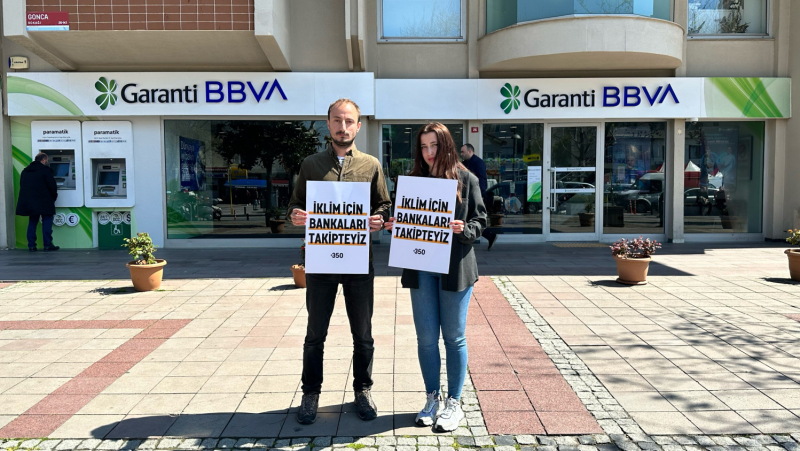We’re watching the banks: Turkey's first activist shareholders

Climate activists mobilized by 350 Turkey have become "activist shareholders" in banks for the first time, having purchased shares in Yapi Kredi, Garanti, Akbank, Isbank, and Sekerbank. They attended the banks' annual general meetings to express that financing should be withheld from coal projects and also from institutions associated with coal.
An "activist shareholder" purchases just one token share in a company, and this gives them the right to attend general meetings as an official shareholder. The goal is to create change in the company's business model.
Efe Baysal, who purchased 10 shares in from Yapi Kredi worth around 100 TL, said during the bank's general meeting, "We’re watching the banks," and that they will continue to monitor whether the banks are adhering to their climate commitments through attendance at the bank's general meetings as active shareholders.
During his speech at the general meeting, Baysal referred to recent disasters, including extreme rainfall, droughts, heatwaves, and wildfires, and stated that the only way to provide resilience against disasters is to develop concrete policies and engage in long-term planning and preparation.
Baysal asked the following questions regarding Yapi Kredi's efforts to transition to a low-carbon economy:
- Has the bank calculated emissions resulting from its loan portfolio, and has it established a reduction target for these emissions? Has Yapi Kredi conducted a sectoral comparison, both globally and nationally, in accordance with these targets? If so, where does the bank stand?
- Were comprehensive stakeholder consultations conducted or planned for as part of these efforts? How will monitoring be conducted?
- As of the end of 2021, renewable energy projects make up 42% of Yapı Kredi's energy portfolio. Are there any existing coal projects which are still being financed within the remaining 48%? If so, are there plans to take action on this?
Barış Eceçelik, who attended the Garanti Bank general assembly meeting, stated that it was the right decision for banks not to finance new coal investments, but asked whether other financial instruments were being provided to companies currently associated with coal.
Eceçelik "The bank needs to understand both its own activities and the climate risks of the companies in its portfolio. If we don’t evaluate this sector as a whole, the steps taken will not achieve their goal. Therefore, it is not enough for the bank to just remove coal projects from its portfolio; it should also refrain from providing financing to other institutions associated with coal," he said, emphasizing the importance of taking precautions against these risks before it is too late.
"Activist shareholders" Pınar Vatansever and Deniz Gümüşel, who contacted Akbank, Şekerbank, and İş Bankası, conveyed their demands for banks to adopt bolder policies and practices to combat climate change.
Pınar Vatanserver said, "Şekerbank has not yet included fossil fuels, especially coal, in its list of prohibited activities within its credit policies. I demand that the bank first and foremost determine its exit strategy from the fossil fuel sector and refrain from providing financing to companies operating in the sector." She emphasized that it is essential to end financing for the extraction, production, and use of fossil fuels such as coal, oil, and natural gas.
Regarding İş Bankası, Deniz Gümüşel said, "We know that the main culprit of the climate crisis is fossil fuels, especially coal. İş Bankası announced that it will not provide financing for new coal projects in the fight against the climate crisis. We see this as an important step taken to combat the climate crisis; however, we wonder whether other financial instruments are being provided to companies associated with coal, despite the fact that coal investments are no longer supported.
Gümüşel continued, "As residents of Muğla, we have been living under the destructive impacts of the Yeniköy, Kemerköy, and Yatağan thermal power plants and coal mines in Muğla for 40 years. The coal mine, which extends uninterrupted for 15 kilometers, has finally reached Milas İkizköy. The İkizköy residents have been struggling to survive for years, living right next to the lignite field and just 7 kilometers away from the Yeniköy Thermal Power Plant. Therefore, at the general assembly meeting, I asked whether İş Bankası has extended any financing related to Yeniköy Kemerköy Elektrik Üretim ve Ticaret A.Ş.? If so, my request is that no financing be provided to any institution associated with coal."
To achieve net-zero goals, every sector will need to decarbonize their production processes. This will not only affect production but also cause a rapid and fundamental change in the investment environment. This is where banks come in as the institutions that provide finance. In particular, they will need to avoid fossil fuel investments and increase climate-friendly investments.
According to the report "Climate Change Approaches of Turkish Banks" written by 350 Turkey, 9 banks, including Yapı Kredi, have stated that they will not finance new coal projects and have made statements about their "carbon-neutral" and/or "net-zero" targets. However, information on their short-term plans to support these targets has not been made public.
As part of the Smoke-Free Money Zone campaign, the details of the report can be viewed bank by bank on the website , and signatures are being collected to encourage banks to exit from fossil fuels.
350.org Turkey can be reached via this link.
